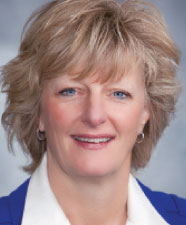An interesting preliminary study was released this year by the Nebraska Unicameral regarding the “cost” of incentives. I have hesitated to comment on it because we wanted to take enough time to review the study thoroughly. Unfortunately, others have rushed to use the preliminary study without regards to potential questionable assumptions and without understanding of how incentives are applied to projects.
We applaud Nebraska senators for their efforts to look at Nebraska Advantage and how we can be the most efficient and transparent in creating a positive business climate for new job growth in our state. The Lincoln, Omaha, and State Chamber, along with our professional economic developers, are working together to determine the assumptions and methodology used under the study. The chairman of the Performance Audit Committee, Senator John Harms, and several other state senators and committee staff met with us recently. The meeting was very productive, and we had the opportunity to raise legitimate points and questions.
We do not believe the preliminary report meets the standard of an accurate, valid, and complete assessment because of the issues our coalition raised.
Nebraska Advantage is a performance-based incentive program that provides certain benefits to companies based on investing in our state and creating jobs. Since January of 2006, Nebraska Advantage has led to commitments of more than 19,960 new jobs and $8.4 billion in new investment according to the Nebraska Department of Economic Development. The study, completed by the Legislative Performance Audit Committee, used a more arbitrary and subjective estimate of new jobs that assumes most jobs would have occurred regardless of incentives. This assumption is just that, an assumption. It is not based on actual confirmation with a company or consulting the Department of Economic Development about specific projects.
I want to be very clear about our position on this issue. Nobody can accurately predict jobs that would have occurred with or without incentives, nor can anyone predict jobs that may be saved or additional jobs created because of incentives.
These facts I know for certain:
• Our incentives are tailored and targeted to companies that can be located anywhere and not tied to a customer or customers in Nebraska. This is because our goal is to attract and expand companies that export products outside of the state to bring additional dollars into the state. So in essence, the concern should be about if this job expansion can happen anywhere and would it have happened anyway.
• Nebraskans have made a conscious decision to make Nebraska Advantage statutory and performance-based, meaning there is openness in the process, fairness in the process, and no benefit paid to a company without that company completing its obligation. Many states pay cash in advance and make arbitrary decisions on a case-by-case basis, potentially inserting politics into the decision-making process. When combined with state-allowed local incentives (unlike other states, Nebraska restricts community activities in economic development), we don’t provide incentives at the same level as many of our competitors. Any discussion should include how we compare to our neighboring states and competitor states.
Please pay attention to this conversation and be willing to look at all information and not just political rhetoric. We look forward to this discussion because we believe we have one of the most successful programs in the U.S. – and also one of the most responsible. It was developed through a bipartisan effort of thoughtful dialogue and study. Any reduction or dismantling leaves us open to emotional decision-making and not rational planning that targets our state objectives of creating quality jobs in high growth industries.
The Chamber’s mission is to improve the lives of Lincoln residents by providing increased economic opportunity and can only be accomplished together. Networking opportunities, business advocacy, and creating economic viability are critical to our success. We encourage you to become a member and help us achieve these goals for Lincoln. For more information, please contact Paul 436-2350.

